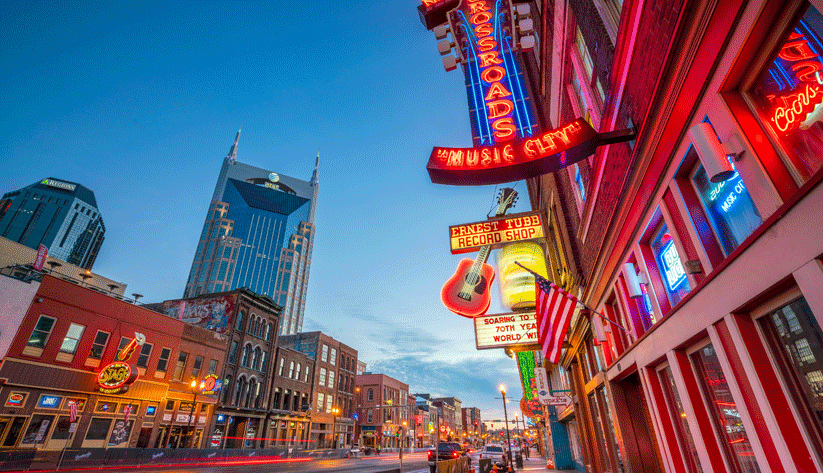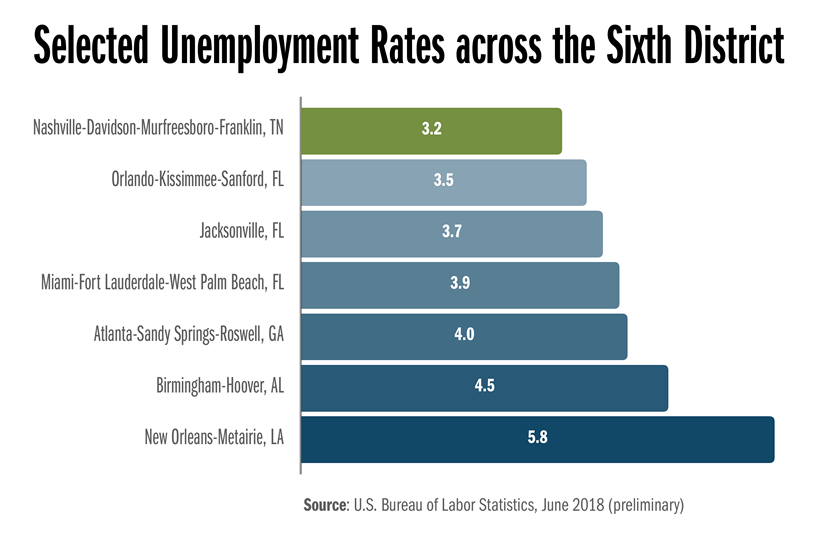
Nashville has seen red-hot growth in businesses and an influx of new residents since the Great Recession, and the sizzle has extended to its tourism sector as well.
The city’s metropolitan area drew 14.5 million leisure travelers in 2017, up 4.6 percent from the record 13.9 million visitors in 2016. This year is expected to set another record for visitors as more hotels and restaurants open and new international air service brings more people to Music City (see the infographic).

"We are a year-round destination," said Deana Ivey, chief marketing officer at the Nashville Convention and Visitors Corporation. "The growth just keeps going."
Branding led to a creative explosion
The city's path from a sleepy southern town to an up-and-coming regional metropolis reflects strategic planning by a coalition of city government, economic development, and corporate leaders that was set in motion about 15 years ago. "We wanted to dig deep and figure out what the brand of Nashville is and what we aspire to, what we could definitely deliver on," said Ivey.
The home of the legendary Grand Ole Opry is synonymous with country music, so the government and business coalition naturally decided to hone in on the area's musical heritage, and the Music City brand was born. Over the years, the area has grown to embrace all music forms, and artists from all over the world flock to Nashville. Additionally, the city has attracted fashion designers, film actors, and even food enthusiasts, establishing a flourishing creative class. "Songwriters come here to write, and they are from every genre," Ivey said. "Creative culinary artists are coming here, and they thrive because creatives feed off each other."
The area's visitors see a city permeated by music, something that becomes apparent even when a traveler steps off a plane into Nashville International Airport, which features live music in any of six performance areas. Performance stages dot the downtown area, and free music events and festivals abound.
Nurturing a diverse economy
A big part of Nashville's cultural and commercial success is its versatile economy, buttressed by health care—the region's largest industry—manufacturing, tourism, and, of course, music and entertainment (see the infographic).

"Economic diversification promotes economic resilience and fosters innovation," said Laurel Graefe, vice president and regional executive at the Atlanta Fed's Nashville Branch. "Middle Tennessee's economic vitality has certainly benefited from the breadth of sectors that have been contributing to the region's growth."
The area's relatively low taxes (Tennessee doesn't levy a state personal income tax) attract companies that relocate there and bring new jobs. The Middle Tennessee region has a cluster of notable colleges and universities, affording workers ample opportunities to gain technical training.
Among the major cities in the Federal Reserve's Sixth District, which includes the states of Alabama, Florida, Georgia, and parts of Louisiana, Mississippi, and Tennessee, Nashville has the lowest unemployment rate (see the chart).

Nashville also possesses real estate's three most treasured advantages: location, location, location. Three major interstates converge in the city, and more than 40 percent of the U.S. population resides within 600 miles of Nashville, traits that local officials tout when recruiting new corporations.
"Our [new business] pipeline is very full—we're not seeing a slowdown," said Courtney Ross, chief economic development officer at the Nashville Area Chamber of Commerce.
Preparing for more growth
The greater Nashville region, which has a population of 1.87 million, is projected to be home to more than 3 million people by the year 2040, according to a forecast from the city's metropolitan planning organization.
Nashville is preparing to accommodate this influx of residents and visitors. Today, construction cranes are nearly as ubiquitous as aspiring musicians. The convention and visitors office says 17 hotels are scheduled to open this year, up from nine in 2017.
Additionally, the airport is in the midst of a billion-dollar expansion that will sharply increase security lanes and parking. It will also add gates, an international arrival concourse, and an on-site hotel. In the fiscal year that ended June 30, 2018, Nashville International Airport served more than 14.9 million passengers, the fifth consecutive year that the airport set a record for passengers. British Airways began flying from Nashville to London's Heathrow Airport this year, putting many other global destinations within reach of the city's businesses and residents.
Still, the city has challenges to confront, including the social pains that often accompany progress.
As more businesses and residents arrive, the city will need an ample supply of affordable housing and improvements to its transportation system. In May, residents voted down a $5.4 billion referendum that would have funded a transit system anchored by light rail.
"The region's undersupply of affordable housing and public transportation options creates uncertainty and additional challenges related to employment for many residents, which can impact the region's productivity," Graefe said. "These are important considerations for Middle Tennessee to be able to optimize the potential of the region's workforce, and they will require collaboration among all sectors as our region continues to evolve and grow."




